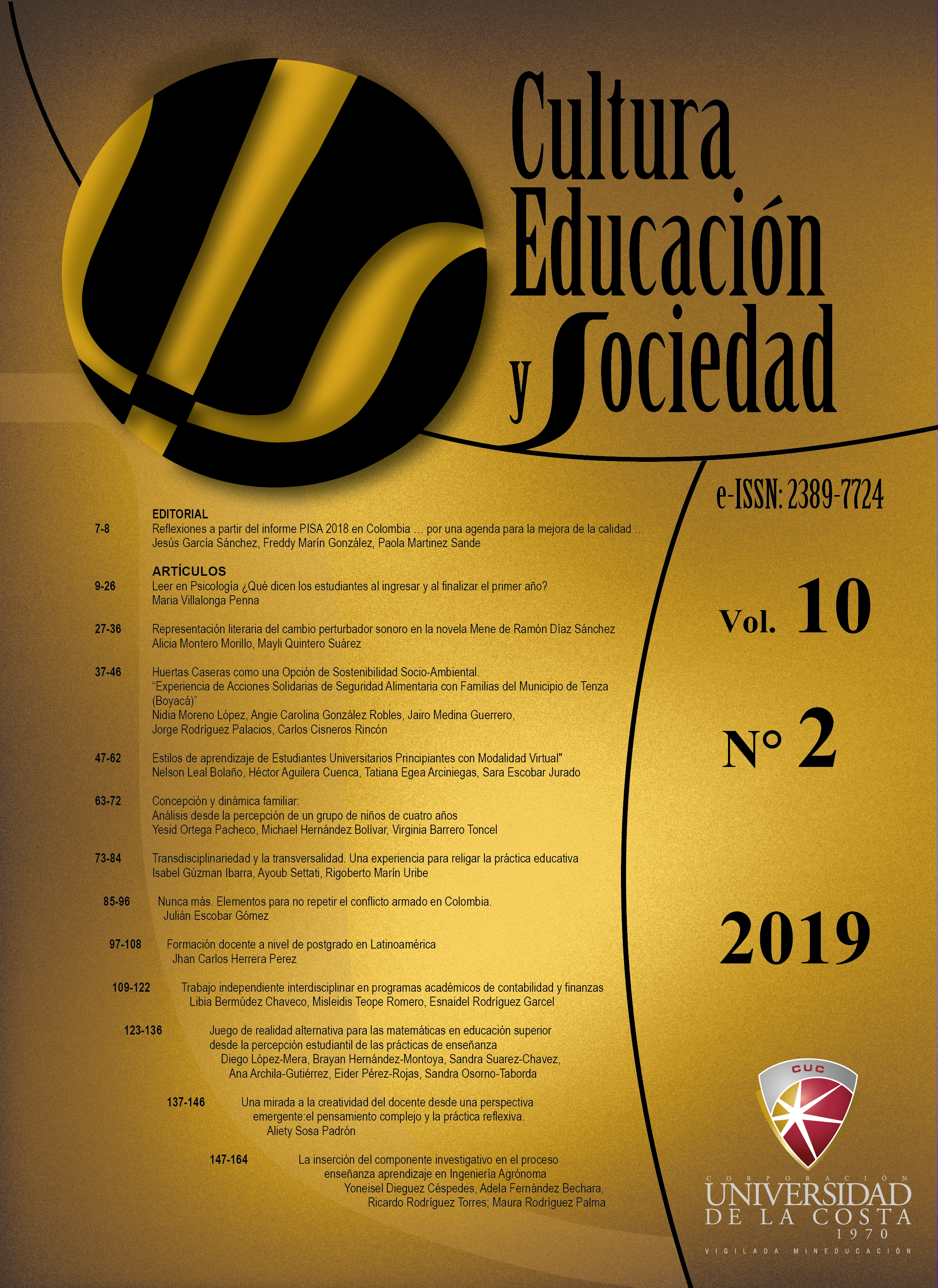Reading in Psychology. What do students tell at the beginning and at the end of the first year?
DOI:
https://doi.org/10.17981/cultedusoc.10.2.2019.01Keywords:
Psychology, Reading, University, Student, PerceptionsAbstract
The perceptions of the new students in relation to what is read and their participation in disciplinary communities are dimensions of singular importance when developing reading processes for academic purposes. From this perspective, this article aims to analyze the conceptions of the first year students of the Academic Programs of Psychology in relation to what is read at the beginning and at the end of the degree. Based on a qualitative approach, we proceed to study the category Reading with educational intentionality Disciplinary as an emerging construct; the collection of information was carried out through in-depth interviews with students on two occasions, one at the beginning of the school year and another, before the end of it. Among the main results, it is worth highlighting that students with high performance manage to build knowledge about text classes and discursive types, as well as evidence of appropriation of the academic genres that are read in this disciplinary community. It is concluded that there are important differences regarding the perceptions obtained by students with medium or high marks in the partials of the subjects in relation to those who have obtained low marks.
Downloads
References
Arnoux, E., Di Stefano, M. & Pereira, C. (2002). La lectura y la escritura en la universidad. Buenos Aires: Eudeba.
Barton, D., Hamilton, M. & Ivanič, R. (2000). Situated literacies: Reading and writing in context. London: Psychology Press.
Barton, D. & Tusting, K. (eds.). (2005). Beyond communities of practice: Language power and social context. Cambridge: University Press.
Bazerman, C. (1997). Discursively structured activities. Mind, culture, and activity, 4(4), 296–308. https://doi.org/10.1207/s15327884mca0404_6
Bazerman, C. (1988). Shaping written knowledge: The genre and activity of the experimental article in science (vol. 356). Madison: University of Wisconsin Press.
Blommaert, J., Street, B., Turner, J. & Scott, M. (2007). Academic literacies: what have we achieved and where to from here. Journal of applied linguistics, 4(1), 137–149. https://doi.org/10.1558/japl.v4i1.137
Bolívar, A. & Parodi, G. (2015). Academic and professional discourse. En E. Lacorte (Ed.) The Routledge Handbook of Hipanic Applied Linguistics (pp. 459–476). Nueva York: Routledge.
Cárdenas, N. y Angulo, F. (2016). Análisis de las Dimensiones de Adaptación, Mejoramiento e Innovación en los Procesos de Aprendizaje Tecnológico. Cultura Educación y Sociedad 7(2), 139–149. https://doi.org/10.17981/cultedusoc.8.2.2017.01
Carlino, P. (2005). Escribir, leer y aprender en la universidad. Buenos Aires: Fondo de Cultura Económica.
Carlino, P. (2003). Alfabetización académica: un cambio necesario, algunas alternativas posibles. Educere, 6(20), 409–420.
Cassany, D. (2005). Literacidad crítica: leer y escribir la ideología. En, Universidad La Rioja, IX Simposio Internacional de la Sociedad Española de Didáctica de la Lengua y la Literatura. Logroño, España.
Ciapuscio, G. E. (2012). La lingüística de los géneros y su relevancia para la traducción. En, M. Shiro, P. Charaudeau y L. Granato (eds.) Los géneros discursivos desde múltiples perspectivas: teorías y análisis (pp. 87–98). Madrid: Iberoamericana Vervuert.
Fernández, G. & Carlino, P. (2010). ¿ En qué se diferencian las prácticas de lectura y escritura de la universidad y las de la escuela secundaria? Lectura y Vida, 31(3), 6–19.
Giudice, J., Godoy, M. & Moyano, E. I. (2016). Prácticas de lectura y escritura en el marco de la enseñanza de la Psicología: avances de una investigación interdisciplinaria. Revista mexicana de investigación educativa, 21(69), 501–526.
Hernández, R., Fernández, C. y Baptista, P. (2008). Metodología de la Investigación. México, D.F.: McGraw Hill.
Jarpa, M. (2015). Escritura en las disciplinas: Géneros académicos evaluativos en un programa de posgrado de Biotecnología. En, G. Parodi & G. Burdiles (eds.) Leer y escribir en contextos académicos y profesionales: Géneros, corpus y métodos (pp. 221–255). Santiago de Chile: Ariel.
Lea, M. (2005). Communities of practice in Higher Education: useful heuristic or educational model? In: D. Barton and K. Tusting (eds.) Beyond communities of practice: language power and social context. Learning in doing: Social, cognitive and computational perspectives (pp. 180–197). Cambridge: Cambridge University Press.
Lillis, T. & Scott, M. (2007). Defining academic literacies research: Issues of epistemology, ideology and strategy. Journal of applied linguistics, 4(1), 5–32. https://doi.org/10.1558/japl. v4i1.5
Marín, F. (2012). Investigación científica. Una visión integrada e interdisciplinaria. Zulia: Ediciones del Vicerrectorado Académico de la Universidad del Zulia.
Mena M. & Huneeus, M. (2017). Convivencia Escolar para el aprendizaje y buen trato de todos: Hacia una mejor comprensión del concepto. Cultura Educación y Sociedad, 8(2), 9–20. https://doi. org/10.17981/cultedusoc.8.2.2017.01
Padilla, C., Douglas, S. & López, E. (2007). Yo expongo: taller de practicas de comprension y produccion de textos expositivos. Córdoba: Comunicarte.
Padilla, C., Douglas, S., & López, E. (2011). Yo argumento: taller de practicas de comprension y produccion de textos argumentativos. Córdoba: Comunicarte.
Parodi, G. (2015). Saber Leer. Santiago de Chile: Aguilar.
Parodi, G. (2008). Géneros académicos y géneros profesionales. Accesos discursivos para saber y hacer. Valparaíso: Ediciones Universitarias de Valparaíso.
Villalonga, M. & Padilla, C. (2016). ¿Qué textos leen en primer año los estudiantes de Psicología? Educação e Pesquisa, 43(2), 515–533. http://dx.doi. org/10.1590/s1517-9702201610150998
Villalonga, M. Padilla, C. & Burín, D. (2014). Comprensión lectora en niños de educación primaria que viven en contextos de pobreza: decodificación, conocimiento léxico e inferencias. Investigaciones en Psicología, 19(2), 135– 156. http://hdl.handle.net/11336/43750
Published
How to Cite
Issue
Section
License
Copyright (c) 2019 CULTURA EDUCACIÓN Y SOCIEDAD

This work is licensed under a Creative Commons Attribution-NonCommercial-NoDerivatives 4.0 International License.
![]()
Creative Commons 2020 CULTURA EDUCACIÓN Y SOCIEDAD
This article is under international license Creative Commons Reconocimiento-NoComercial-SinObrasDerivadas 4.0.
The published articles are the sole responsibility of their authors and do not necessarily reflect the opinions of the editorial committee.
CULTURA EDUCACIÓN Y SOCIEDAD respects the moral rights of its authors, who assign to the editorial committee the patrimonial rights of the published material. In turn, the authors inform that this work is unpublished and has not been previously published.
All articles are under a:
Licencia Creative Commons Atribución-NoComercial-SinDerivadas 4.0 Internacional.
![]()


 English
English
 Español (España)
Español (España)




_12.53_.27_p_. m_._3.png)





_12.57_.35_p_. m_._3.png)
_12.50_.37_p_. m_._3.png)



